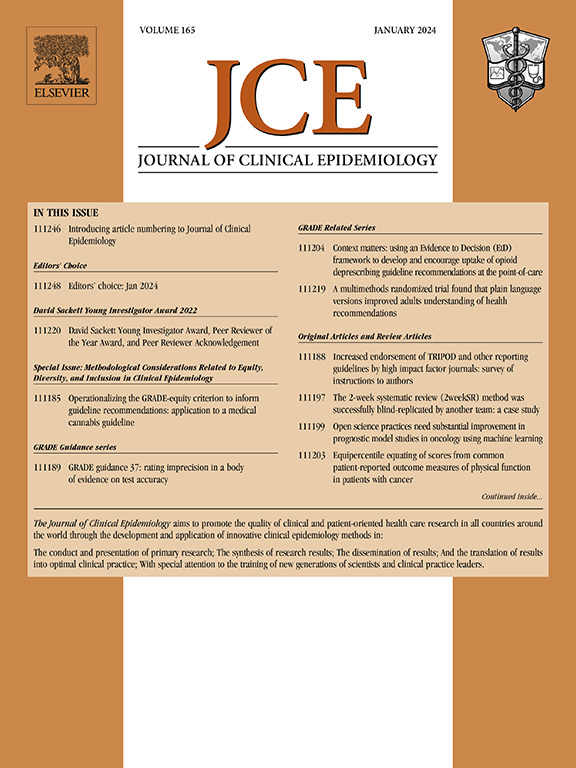以系统性综述中的种族健康公平为中心 文件 5:方法和干预措施综述。
IF 7.3
2区 医学
Q1 HEALTH CARE SCIENCES & SERVICES
引用次数: 0
摘要
目标:我们旨在:1)评估针对种族化人群的干预措施的系统性综述中使用的方法,以改善种族健康公平;2)研究系统性综述中为促进种族健康公平而评估的干预措施类型:研究设计和方法:我们检索了 MEDLINE、Cochrane 和 Campbell 数据库中 2020 年 1 月至 2023 年 1 月期间发表的评估干预措施的综述,这些干预措施主要针对种族化人群,以减轻种族健康不平等现象:我们分析了 157 篇关于种族化人群的综述。只有 22 篇(14%)综述涉及种族主义在推动与综述问题相关的种族健康不平等中的作用。11%(7 篇)的综述在概念化种族不平等时考虑了交叉性。三分之二(105 篇,67%)的综述对纳入的研究进行了描述性总结,而不是对其进行综合。在对效应大小进行量化的综述中,54%(21 篇)使用了有偏见的综合方法,如计票。最常见的评估方法是调整干预措施以满足种族化人群的需求。综述主要集中于评估减少种族差异的干预措施,而不是增加种族人口的结构性机会:通过提高方法学质量、界定种族主义在问题中的作用、使用可靠的分析方法以及评估过程和实施结果,种族健康公平方面的综述可以得到改善。需要更加注重评估结构性干预措施,以改善种族人口的机会,并在政治和社会议程中优先考虑这些问题。本文章由计算机程序翻译,如有差异,请以英文原文为准。
Centering racial health equity in systematic reviews paper 5: a methodological overview of methods and interventions
Objectives
We aim to (1) evaluate the methods used in systematic reviews of interventions focused on racialized populations to improve racial health equity and (2) examine the types of interventions evaluated for advancing racial health equity in systematic reviews.
Study Design and Setting
We searched MEDLINE, Cochrane, and Campbell databases for reviews evaluating interventions focused on racialized populations to mitigate racial health inequities, published from January 2020 to January 2023.
Results
We analyzed 157 reviews on racialized populations. Only 22 (14%) reviews addressed racism's role in driving racial health inequities related to the review question. Eleven percent (7) of reviews considered intersectionality when conceptualizing racial inequities. Two-thirds (105, 67%) provided descriptive summaries of included studies rather than synthesizing them. Among those that quantified effect sizes, 54% (21) used biased synthesis methods like vote counting. The most common method assessed was tailoring interventions to meet the needs of racialized populations. Reviews mainly focused on assessing interventions to reduce racial disparities rather than enhancing structural opportunities for racialized populations.
Conclusion
Reviews for racial health equity could be improved by enhancing methodologic quality, defining the role of racism in the question, using reliable analytical methods, and assessing process and implementation outcomes. More focus is needed on assessing structural interventions to improve opportunities for racialized populations and prioritize these issues in political and social agendas.
求助全文
通过发布文献求助,成功后即可免费获取论文全文。
去求助
来源期刊

Journal of Clinical Epidemiology
医学-公共卫生、环境卫生与职业卫生
CiteScore
12.00
自引率
6.90%
发文量
320
审稿时长
44 days
期刊介绍:
The Journal of Clinical Epidemiology strives to enhance the quality of clinical and patient-oriented healthcare research by advancing and applying innovative methods in conducting, presenting, synthesizing, disseminating, and translating research results into optimal clinical practice. Special emphasis is placed on training new generations of scientists and clinical practice leaders.
 求助内容:
求助内容: 应助结果提醒方式:
应助结果提醒方式:


